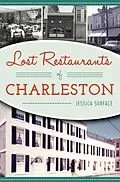Discover the culinary heritage of South Carolina's famous port city with this guide to historic restaurants that have come and gone.
Once a sleepy city of taverns and coffeehouses, Charleston evolved into a culinary powerhouse of innovative chefs and restaurateurs. Jessica Surface, founder of Chow Down Charleston Food Tours, celebrates the city's rich cultural history in Lost Restaurants of Charleston.
The origins of she-crab soup trace back through Everett's Restaurant. The fine dining of Henry's evolved from a Prohibition-era speakeasy. Desserts were flambéed from the pulpit of a deconsecrated church at Chapel Market Place, and Robert's hosted Charleston's famous singing chef. From blind tigers to James Beard Awards, Surface explores the stories and sites that give Charleston its unique flavor.
Autorentext
Jessica Surface is a certified tour guide with the city of Charleston. She started Chow Down Charleston Food Tours in 2014 with her husband, Reid, which focused on showcasing smaller, off-the-beaten-path restaurants that people have a tendency to overlook when they visit the city. In her spare time, Jessica also works as a pediatric occupational therapist and lives in Mount Pleasant with her husband and two dogs, Stu and Dori.
Klappentext
Once a sleepy city of taverns and coffeehouses, Charleston's reputation as a culinary powerhouse is rooted in its rich history. The origins of she-crab soup trace back through Everett's Restaurant. The fine dining of Henry's evolved from a Prohibition-era speakeasy. Desserts were flambeed from the pulpit of a deconsecrated church at Chapel Market Place, and Robert's hosted Charleston's famous singing chef. Diners became regulars at Kitty's Fine Foods or Brooks Restaurant on their first visit, while the rise of French cuisine from the Wine Cellar, Marianne and Philippe Million helped elevate the dining scene. From blind tigers to James Beard Awards, author and local tour guide Jessica Surface explores the stories and history of Charleston's love of food.
